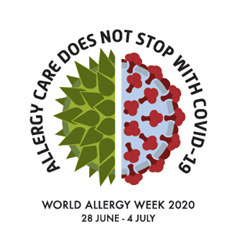
World Allergy Week 2020 logo
Allergists can help ease patients’ concerns by identifying the differences between allergies and COVID-19, making health assessments, and reviewing treatment plans.
MILWAUKEE (PRWEB)
June 18, 2020
World Allergy Organization (WAO) will host World Allergy Week from June 28 to July 4, 2020, to emphasize the importance of maintaining regular care of allergies and asthma during the COVID-19 pandemic.
COVID-19, short for “coronavirus disease 2019”, is a disease spreading around the world caused by infection with a new strain of coronavirus (SARS-CoV-2). Patients with symptoms are very contagious, but even those with mild or no symptoms can still infect others. A vaccine against COVID-19 is not yet available.
A pandemic can be a time of anxiety for those with asthma and allergies such as allergic rhinitis (hay fever), eczema/dermatitis, allergic conjunctivitis, food allergies, and other conditions. Symptom similarity between allergies and COVID-19 can be confusing. Sneezing and itching, for example, are common in allergic rhinitis, while fever, fatigue, and shortness of breath appear in COVID-19. Allergists can help ease patients’ concerns by identifying the differences between allergies and COVID-19, making health assessments, and reviewing treatment plans.
“It is important that individuals do not stop taking their prescribed allergy or asthma medications, including inhaled or oral corticosteroids and other asthma controller medications – with or without a pandemic,” according to Sandra N. González-Díaz, MD, PhD, of Universidad Autónoma de Nuevo León in México. “They should consult their physicians about getting the care they need while limiting their exposure to the virus.” In many areas, health care practitioners use telemedicine and telephone consults for non-emergencies to avoid the risk of infection from face-to-face medical visits.
If you have asthma, continuing to control it could help you better defend against the virus. According to Bryan Martin, DO, of The Ohio State University in Columbus, Ohio, USA. “Most respiratory viruses are common triggers of severe asthma attacks. When you have asthma, underlying swelling and inflammation in the lungs can make it difficult to fight off viruses. Taking prescribed controller therapy daily, whether you have symptoms or not, helps repair that inflammation and fight off viruses more efficiently.”
Allergy care might change for patients infected with COVID-19, so it is important that they contact their physicians to discuss their symptoms as soon as possible. According to Motohiro Ebisawa, MD, PhD, of Sagamihara National Hospital in Sagamihara, Japan, and President of the World Allergy Organization. “Professional help is essential to understanding what is causing symptoms such as shortness of breath, chest tightness, or difficulty breathing. Patients should not assume these symptoms are either from their asthma or COVID-19 but consult their physicians immediately in case emergency care is needed.”
The international medical community agrees there is much to understand yet about COVID-19 and the best treatment for those who have become sick. World Allergy Week 2020 organizers are emphasizing the need for patients and physicians alike to stay updated on accurate medical information about COVID-19 and allergic disease and communicate regularly for optimal symptom management, disease prevention, and quality of life.
International allergy experts will present “COVID-19 and Allergic Diseases” a two hour-webinar with a live question and answer session, hosted by WAO on July 2, 2020. It will begin at 8:00 AM EDT (New York). Click here to find your local time: https://www.timeanddate.com/worldclock/converter-classic.html. Find details about the WAO webinar and registration and other resources at: http://www.worldallergyweek.org.
To find an allergy/immunology member society of the World Allergy Organization in your country or region, visit: http://www.worldallergy.org/about-wao/member-societies.
About the World Allergy Organization
The World Allergy Organization (WAO) is an international alliance of 103 regional and national allergy, asthma and immunology societies. Through collaboration with its Member Societies WAO provides a wide range of educational and outreach programs, symposia and lectureships to allergists/immunologists around the world and conducts initiatives related to clinical practice, service provision, and physical training in order to better understand and address the challenges facing allergists/immunologists worldwide. (http://www.worldallergy.org)
Share article on social media or email:

